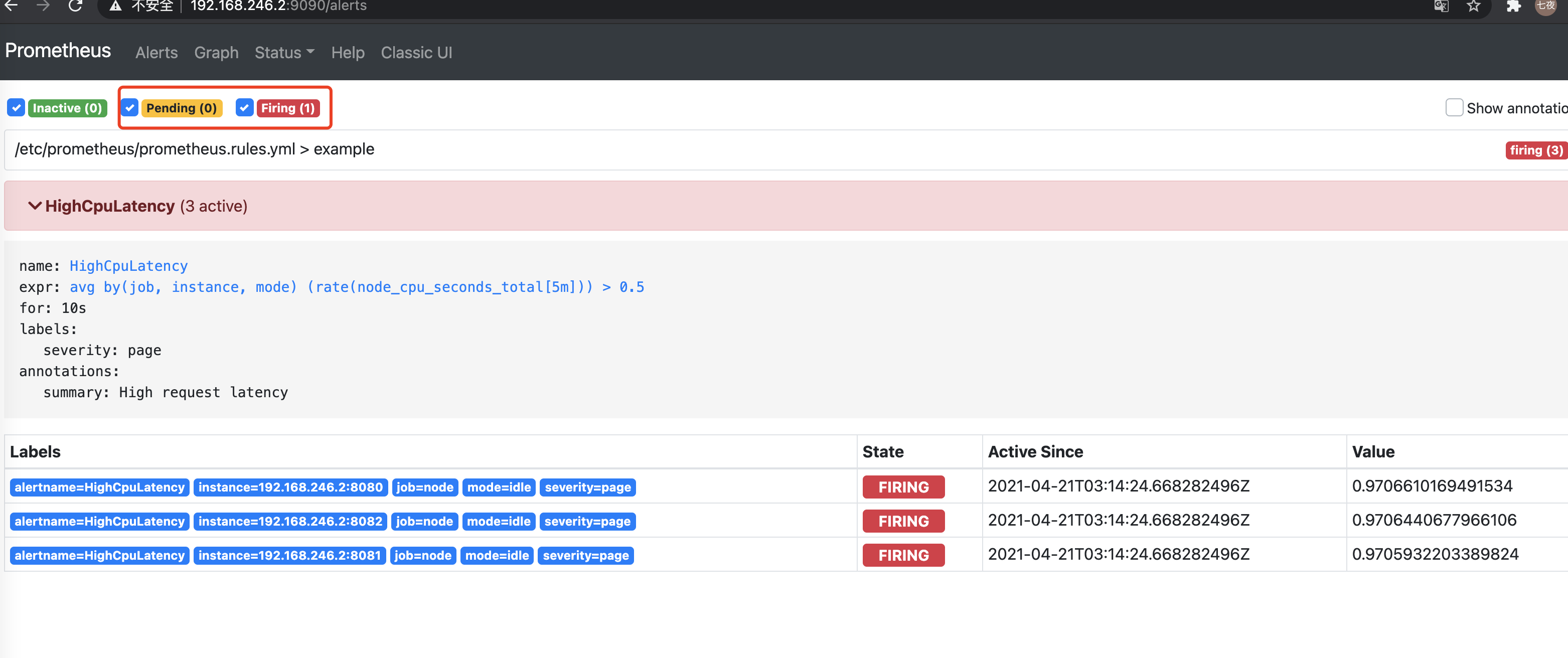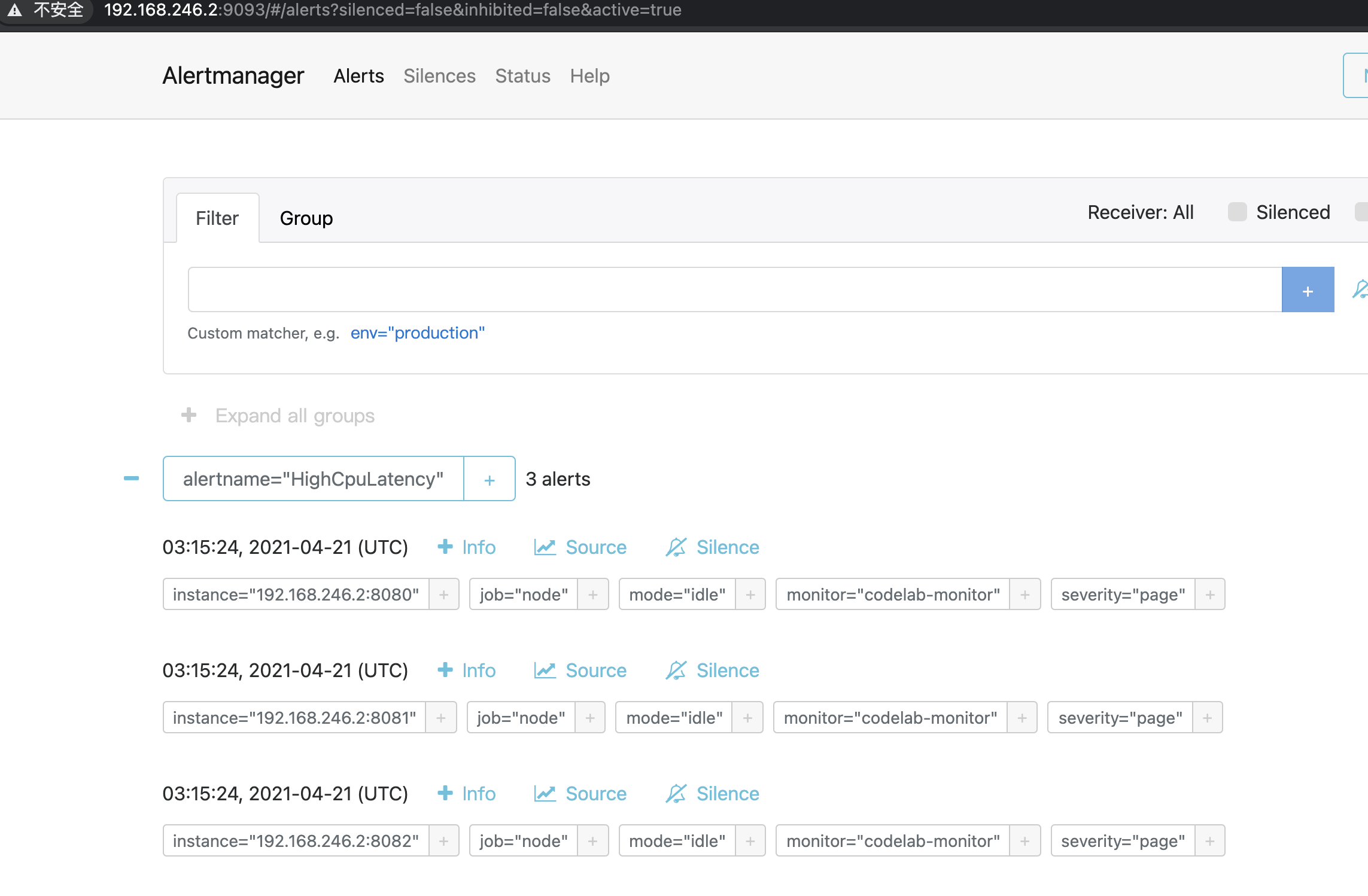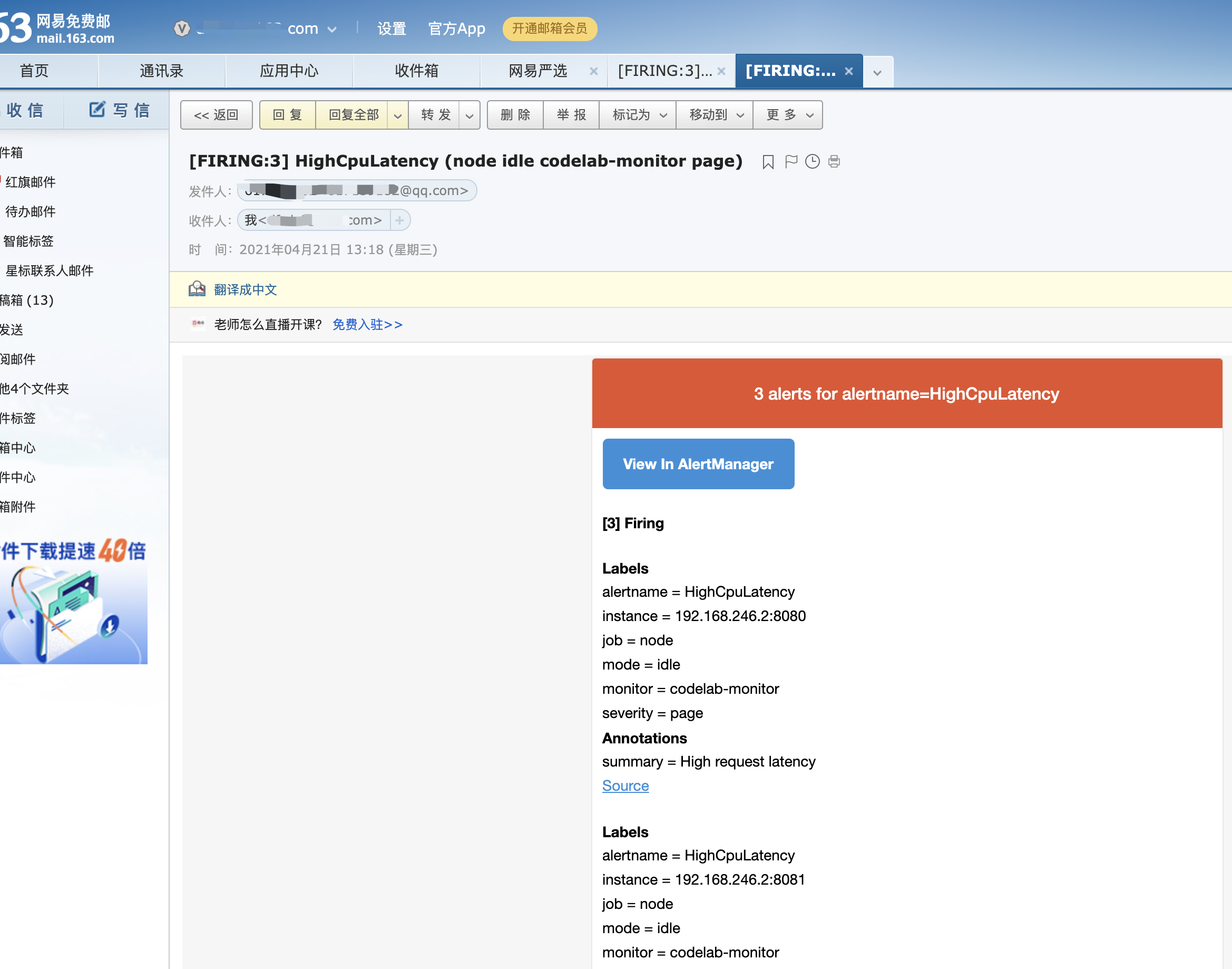本次的想法是做服务监控 并告警 主要线路如下图所示

1、运行prometheus docker方式
docker run -itd -p 9090:9090 -v /opt/prometheus/prometheus.yml:/etc/prometheus/prometheus.yml prom/prometheus
2、prometheus.yml 初始配置文件如下:
global: scrape_interval: 15s # By default, scrape targets every 15 seconds. 全局默认值 15秒抓取一次数据 # Attach these labels to any time series or alerts when communicating with # external systems (federation, remote storage, Alertmanager). external_labels: monitor: 'codelab-monitor' # A scrape configuration containing exactly one endpoint to scrape: # Here it's Prometheus itself. scrape_configs: # The job name is added as a label `job=<job_name>` to any timeseries scraped from this config. - job_name: 'prometheus' # Override the global default and scrape targets from this job every 5 seconds. scrape_interval: 5s static_configs: - targets: ['localhost:9090']
3、默认 prometheus 会有自己的指标接口http://192.168.246.2:9090/metrics 内容部分截取如下
# HELP go_gc_duration_seconds A summary of the pause duration of garbage collection cycles. # TYPE go_gc_duration_seconds summary go_gc_duration_seconds{quantile="0"} 2.6636e-05 go_gc_duration_seconds{quantile="0.25"} 0.000123346 go_gc_duration_seconds{quantile="0.5"} 0.000159706 go_gc_duration_seconds{quantile="0.75"} 0.000190857 go_gc_duration_seconds{quantile="1"} 0.001369042
4、可以登录9090端口去看看prometheus主界面 可以执行PromQL (Prometheus Query Language) 来excute得到结果
比如这个 prometheus_target_interval_length_seconds{quantile="0.99"}
具体PromQL语法示例请参考官网https://prometheus.io/docs/prometheus/latest/querying/basics/

5、上面的数据是prometheus自己的 ,下面我们自己生产数据给它 有很多公共的exporter 可以用 比如 node_exporter 他可以暴露机器一些基本的通用指标。
也可以执行python自定义编程 取指标 让自己成为一个exporter
安装node_exporter 官网例子 但是不要使用127.0.0.1 因为我的prometheus是docker起的 和宿主机的127.0.0.1是不通的 它抓取不到数据的,请改成实际的主机地址
ps:其他exporter 可参考地址 https://prometheus.io/docs/instrumenting/exporters/
tar -xzvf node_exporter-*.*.tar.gz cd node_exporter-*.* # Start 3 example targets in separate terminals: ./node_exporter --web.listen-address 127.0.0.1:8080 ./node_exporter --web.listen-address 127.0.0.1:8081 ./node_exporter --web.listen-address 127.0.0.1:8082
6、需要修改prometheus.yml增加job 抓取exproter 修改后的如下 增加了 一个job 里面有三个exporter 标签是随便配的
global: scrape_interval: 15s # By default, scrape targets every 15 seconds. # Attach these labels to any time series or alerts when communicating with # external systems (federation, remote storage, Alertmanager). external_labels: monitor: 'codelab-monitor' # A scrape configuration containing exactly one endpoint to scrape: # Here it's Prometheus itself. scrape_configs: # The job name is added as a label `job=<job_name>` to any timeseries scraped from this config. - job_name: 'prometheus' # Override the global default and scrape targets from this job every 5 seconds. scrape_interval: 5s static_configs: - targets: ['localhost:9090'] - job_name: 'node' # Override the global default and scrape targets from this job every 5 seconds. scrape_interval: 5s static_configs: - targets: ['192.168.246.2:8080', '192.168.246.2:8081'] labels: group: 'production' - targets: ['192.168.246.2:8082'] labels: group: 'canary'
6、查看页面 是否ok了

7、可以看看node_exporter 暴露的指标例子 比如有如下的
node_cpu_seconds_total{cpu="0",mode="idle"} 2963.27
node_cpu_seconds_total{cpu="0",mode="iowait"} 0.38
node_cpu_seconds_total{cpu="0",mode="irq"} 0
node_cpu_seconds_total{cpu="0",mode="nice"} 0
node_cpu_seconds_total{cpu="0",mode="softirq"} 0.35
node_cpu_seconds_total{cpu="0",mode="steal"} 0
node_cpu_seconds_total{cpu="0",mode="system"} 19.19
node_cpu_seconds_total{cpu="0",mode="user"} 16.96
node_cpu_seconds_total{cpu="1",mode="idle"} 2965.47
node_cpu_seconds_total{cpu="1",mode="iowait"} 0.37
node_cpu_seconds_total{cpu="1",mode="irq"} 0
node_cpu_seconds_total{cpu="1",mode="nice"} 0.03
node_cpu_seconds_total{cpu="1",mode="softirq"} 0.28
node_cpu_seconds_total{cpu="1",mode="steal"} 0
node_cpu_seconds_total{cpu="1",mode="system"} 18.42
node_cpu_seconds_total{cpu="1",mode="user"} 17.95
8、如果我们想看 近5分钟内 每个实例的所有cpus的平均每秒CPU时间速率 可以这样写
avg by (job, instance, mode) (rate(node_cpu_seconds_total[5m]))
图例结果

9、下面设置一个rules规则,写一个文件 prometheus.rules.yml
groups: - name: cpu-node rules: - record: job_instance_mode:node_cpu_seconds:avg_rate5m expr: avg by (job, instance, mode) (rate(node_cpu_seconds_total[5m]))
10、现在发现配置文件太多了 我们重新用另一种方式启动docker 优化一下 把本地配置文件都放在 /opt/prometheus/,原来的docker可删除了。
--web.enable-lifecycle 参数支持热更新 接口是curl -X POST http://192.168.246.2:9090/-/reload
docker run -itd -p 9090:9090 -v /opt/prometheus/:/etc/prometheus/ prom/prometheus --config.file=/etc/prometheus/prometheus.yml --web.enable-lifecycle
11、查看rules

12、上面只是规则,并没有告警,我们假设 avg by (job, instance, mode) (rate(node_cpu_seconds_total[5m])) > 0.5 就触发 cpu警告 这是假设的测试
我们需要rules文件如下:
groups: - name: example rules: - alert: HighCpuLatency expr: avg by (job, instance, mode) (rate(node_cpu_seconds_total[5m])) > 0.5 for: 10s labels: severity: page annotations: summary: High request latency
写到prometheus.rules.yml文件中 ,注意groups不能复制进去 key不能重复 可以使用命令检查rules文件是否正确
[root@test prometheus]# ./prometheus-2.26.0.linux-amd64/promtool check rules prometheus.rules.yml Checking prometheus.rules.yml FAILED: prometheus.rules.yml: yaml: unmarshal errors: line 6: mapping key "groups" already defined at line 1 prometheus.rules.yml: yaml: unmarshal errors: line 6: mapping key "groups" already defined at line 1 [root@test prometheus]# ./prometheus-2.26.0.linux-amd64/promtool check rules prometheus.rules.yml Checking prometheus.rules.yml SUCCESS: 2 rules found [root@test prometheus]#
13、热更新一下
curl -X POST http://192.168.246.2:9090/-/reload
这次不用重启docker了
查看页面 rules会增加一个 且alert会先有pending状态,等符合条件后就触发告警

14、下面启动alertmanager
启动之前要做两个配置,首先把 alertmanager 的IP和端口配置到prometheus.yml中
最会面增加了 alerting的配置 这样 prometheus 就连上 alertmanager
global: scrape_interval: 15s # By default, scrape targets every 15 seconds. # Attach these labels to any time series or alerts when communicating with # external systems (federation, remote storage, Alertmanager). external_labels: monitor: 'codelab-monitor' rule_files: - 'prometheus.rules.yml' # A scrape configuration containing exactly one endpoint to scrape: # Here it's Prometheus itself. scrape_configs: # The job name is added as a label `job=<job_name>` to any timeseries scraped from this config. - job_name: 'prometheus' # Override the global default and scrape targets from this job every 5 seconds. scrape_interval: 5s static_configs: - targets: ['localhost:9090'] - job_name: 'node' # Override the global default and scrape targets from this job every 5 seconds. scrape_interval: 5s static_configs: - targets: ['192.168.246.2:8080', '192.168.246.2:8081'] labels: group: 'production' - targets: ['192.168.246.2:8082'] labels: group: 'canary' alerting: alertmanagers: - static_configs: - targets: ["192.168.246.2:9093"]
第二个配置 我们先测试邮件告警,写的 alertmanager 配置如下
注意修改的部分 qq如何申请授权码请百度一下
smtp_smarthost: 'smtp.qq.com:465'
smtp_from: '6171391@qq.com'
smtp_auth_username: '6171391@qq.com'
smtp_auth_password: 'qq授权码'
smtp_require_tls: false
默认不做任何过滤选择的接收人
- to: 'dfwl@163.com'
global: # The smarthost and SMTP sender used for mail notifications. smtp_smarthost: 'smtp.qq.com:465' smtp_from: '6171391@qq.com' smtp_auth_username: '6171391@qq.com' smtp_auth_password: 'qq授权码' smtp_require_tls: false # The directory from which notification templates are read. templates: - '/etc/alertmanager/template/*.tmpl' # The root route on which each incoming alert enters. route: group_by: ['alertname', 'cluster', 'service'] group_wait: 30s # When the first notification was sent, wait 'group_interval' to send a batch # of new alerts that started firing for that group. group_interval: 1m # If an alert has successfully been sent, wait 'repeat_interval' to # resend them. repeat_interval: 7h # A default receiver receiver: team-X-mails # The child route trees. routes: # This routes performs a regular expression match on alert labels to # catch alerts that are related to a list of services. - match_re: service: ^(foo1|foo2|baz)$ receiver: team-X-mails # The service has a sub-route for critical alerts, any alerts # that do not match, i.e. severity != critical, fall-back to the # parent node and are sent to 'team-X-mails' routes: - match: severity: critical receiver: team-X-pager - match: service: files receiver: team-Y-mails routes: - match: severity: critical receiver: team-Y-pager # This route handles all alerts coming from a database service. If there's # no team to handle it, it defaults to the DB team. - match: service: database receiver: team-DB-pager # Also group alerts by affected database. group_by: [alertname, cluster, database] routes: - match: owner: team-X receiver: team-X-pager continue: true - match: owner: team-Y receiver: team-Y-pager # Inhibition rules allow to mute a set of alerts given that another alert is # firing. # We use this to mute any warning-level notifications if the same alert is # already critical. inhibit_rules: - source_match: severity: 'critical' target_match: severity: 'warning' # Apply inhibition if the alertname is the same. # CAUTION: # If all label names listed in `equal` are missing # from both the source and target alerts, # the inhibition rule will apply! equal: ['alertname', 'cluster', 'service'] receivers: - name: 'team-X-mails' email_configs: - to: 'dfwl@163.com' - name: 'team-X-pager' email_configs: - to: 'team-X+alerts-critical@example.org' pagerduty_configs: - service_key: <team-X-key> - name: 'team-Y-mails' email_configs: - to: 'team-Y+alerts@example.org' - name: 'team-Y-pager' pagerduty_configs: - service_key: <team-Y-key> - name: 'team-DB-pager' pagerduty_configs: - service_key: <team-DB-key>
15、手动启动测试一下 生产环境可以docker或k8s等方式启动
./alertmanager --config.file=alertmanager.yml
16、alertmanager页面能同步到告警

过一会就会发邮件了
group_interval: 1m 意思 从第一次接受告警1m后还在就发
